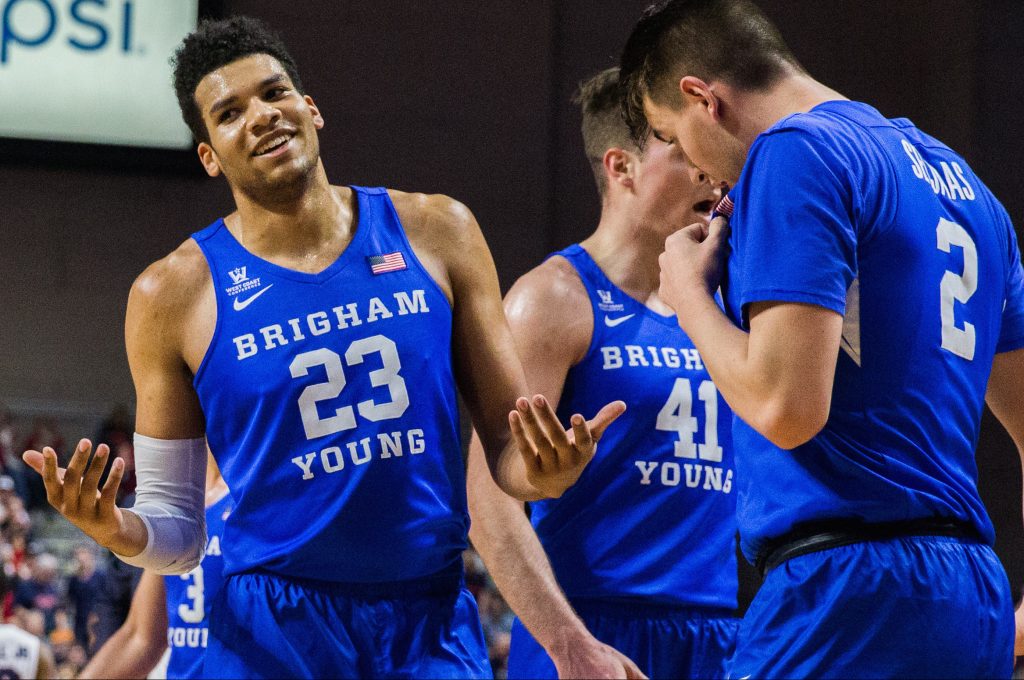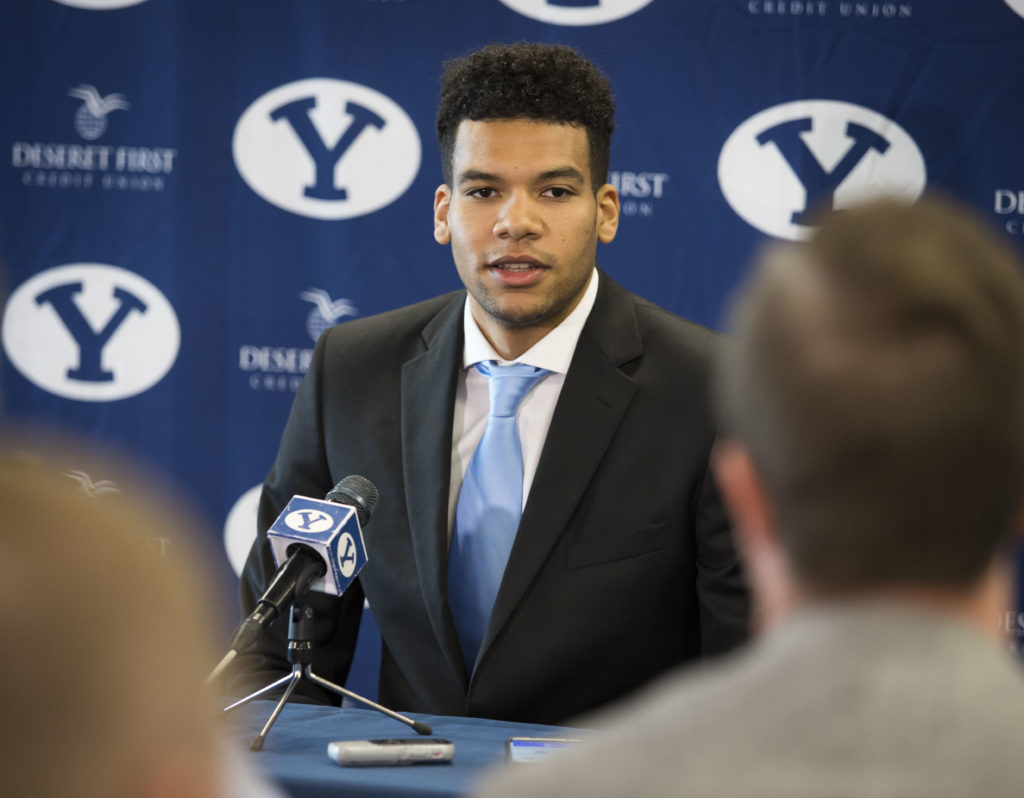
Yoeli Childs has been given a nine-game suspension by the NCAA for signing with an agent before filing paperwork and receiving expenses not permitted by the NCAA.
This isn’t the first time that the NCAA has come down hard on BYU in recent history. In 2018, the NCAA decided that former BYU basketball player Nick Emery’s actions called for the vacating of 47 wins, recruiting restrictions and two years of probation. In addition, BYU lost one scholarship for the 2019-20 season and incurred a $5,000 fine, but these two penalties were self-imposed by BYU. Though Emery was the lone recipient of the benefits from boosters, the NCAA decided that BYU did not do enough to self-monitor Emery, therefore giving penalties to BYU’s basketball program as a whole and not just Emery.
Childs and BYU self-reported the problem, with Childs citing that he is a man of integrity. In a press conference held on Aug. 9, Childs said that he knew there could be repercussions in the process of returning to BYU, but he still decided to come back. Head coach Mark Pope added that Childs had many lavish offers from professional teams overseas but ultimately chose to come back to BYU.
According to BYU athletics, “The NCAA determined that Childs’ signing with an agent was impermissible due to the fact that he signed before filing paperwork required by the NCAA.” This comes less than a year after the NCAA implemented new rules stating that players could be reinstated to their respective college programs after declaring for the NBA draft as long as they “request an Undergraduate Advisory Committee evaluation, participate in the NBA combine and aren’t drafted,” according to the NCAA rulebook. Players must notify their athletic directors of their intent to return to school no later than 5 p.m. on the first Monday following the draft.
“On May 30, 2019, Childs announced his intentions to return to BYU for his senior season, and BYU commenced the process to reinstate Childs with the NCAA,” BYU athletics’ Kyle Chilton said in a press release. “It was determined that Childs received expenses not permitted by the NCAA – costs related to a basketball trainer and travel expenses. Childs promptly paid back all of the expenses, plus interest.
The NCAA rulebook states, “Agents can pay for meals and transportation for players and their families if the expenses are related to the agent selection process.” It is easy to see how the new rules would be a cause for confusion, and Childs is just the most recent BYU athlete to be on the receiving end of a harsh NCAA lashing.
ESPN’s Jay Bilas, a well-known college basketball analyst, was quick to criticize the NCAA’s decision to suspend Childs. Bilas told BYU Sports Nation that he felt the penalty was disproportionate to the offense, adding the message is clear to any player that, “if you decide to test the waters (of the NBA) just go, because you are going to get jerked around like nobody’s business if you decide to come back. He also said that the NCAA should be embarrassed.
Utah was recently given penalties for visiting a recruit at his high school during the time where in-person, off-campus recruiting was prohibited by the NCAA. Later, Utah also used an official visit with this recruit when he was unofficially visiting SLCC. This put Utah over the allotted number of official visits, a number decided by the NCAA.
The associate coach that violated these long-standing, known NCAA rules was given a one-week suspension and an off-site recruiting ban while the university was fined $5,000 and placed on a two-year probation period.
The University of North Carolina was faced with a major problem in 2017 when it was announced that there had been years of academic misconduct dating back to 1997. The misconduct was cited as “paper courses” — courses that seldom involved a member of university faculty and generally involved only completing one short paper in exchange for a passing grade.
The penalty for this gross misconduct was controversial, as the NCAA’s Committee on Infractions decided that it couldn’t prove these classes were only taken by athletes but regular students as well, therefore giving no unfair advantage to athletes. The NCAA decided there was not a violation of NCAA rules, and UNC was given no penalty as a result of the investigation.

In 2017, former Alabama basketball 5-star recruit Collin Sexton was part of a large NCAA scam which included former Alabama associate athletic director Kobie Baker. Baker accepted cash bribes from a financial adviser, which was traded for his influence in recruiting players to sign with that adviser. Sexton was given just a one-game suspension for his ties to the scandal.
Sexton has also been linked to accepting monetary bribes of his own, allegedly receiving $5,000 from his agent Christian Dawkins while his family received money for travel. Sexton’s brother was also allegedly given a four-year job. Dawkins received several penalties, including a prison sentence — penalties that were also linked to his involvement in a scandal surrounding bribing players to sign with specific sponsors. Alabama has yet to be penalized.
The penalty handed down to Childs is heavy, especially taking into consideration that these rules are brand new. Childs is the first athlete to receive penalties after going through the new NCAA process.
The NCAA recently created a rule stating that NBA player agents must have a bachelor’s degree, but this week-old rule was overturned on Aug. 12. Many are calling for the NCAA to overturn the penalty to Childs, a penalty that has already been appealed by Childs and BYU basketball. The NCAA did not rescind the penalty, and Childs will remain suspended for the first nine games of the 2019-20 season.




